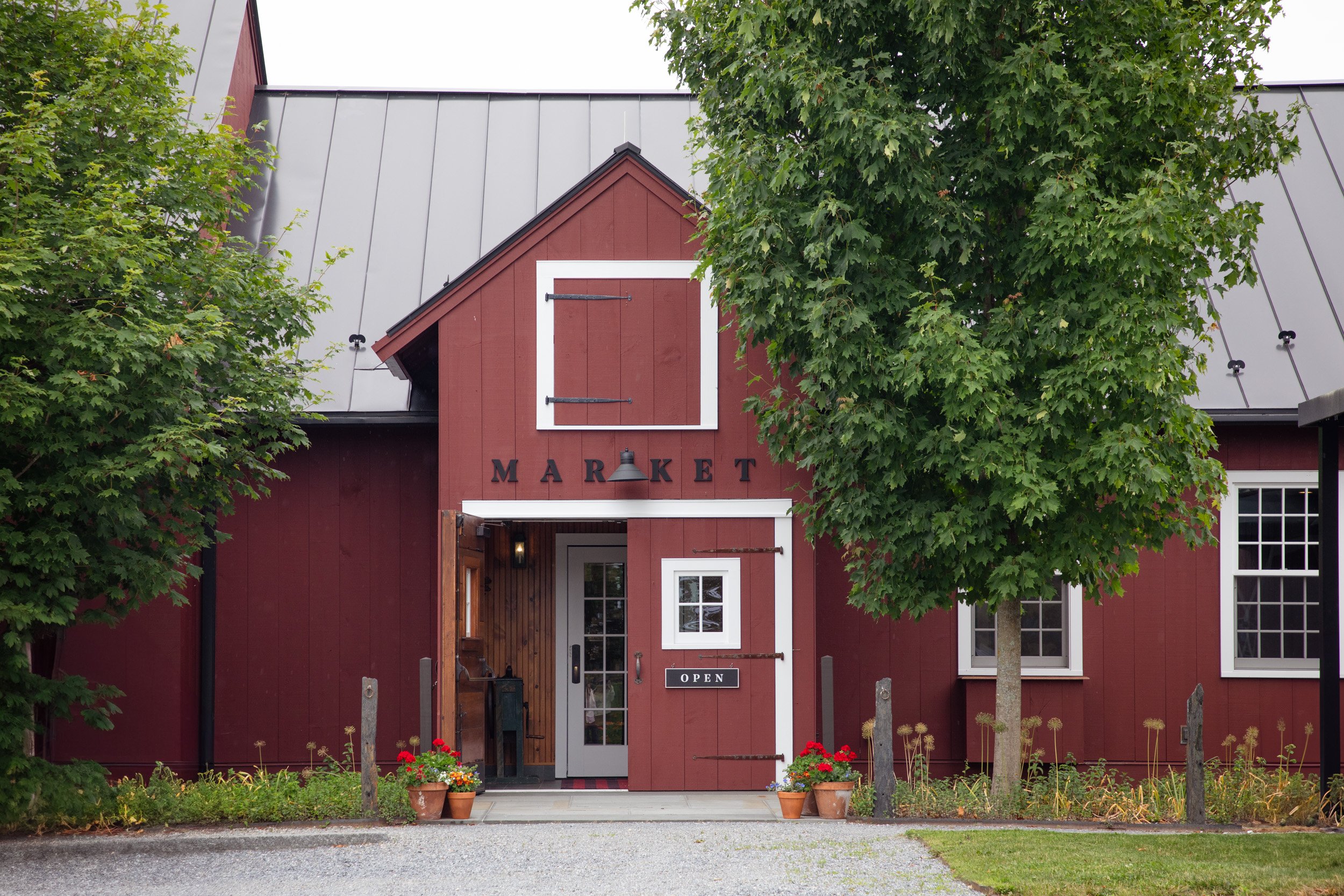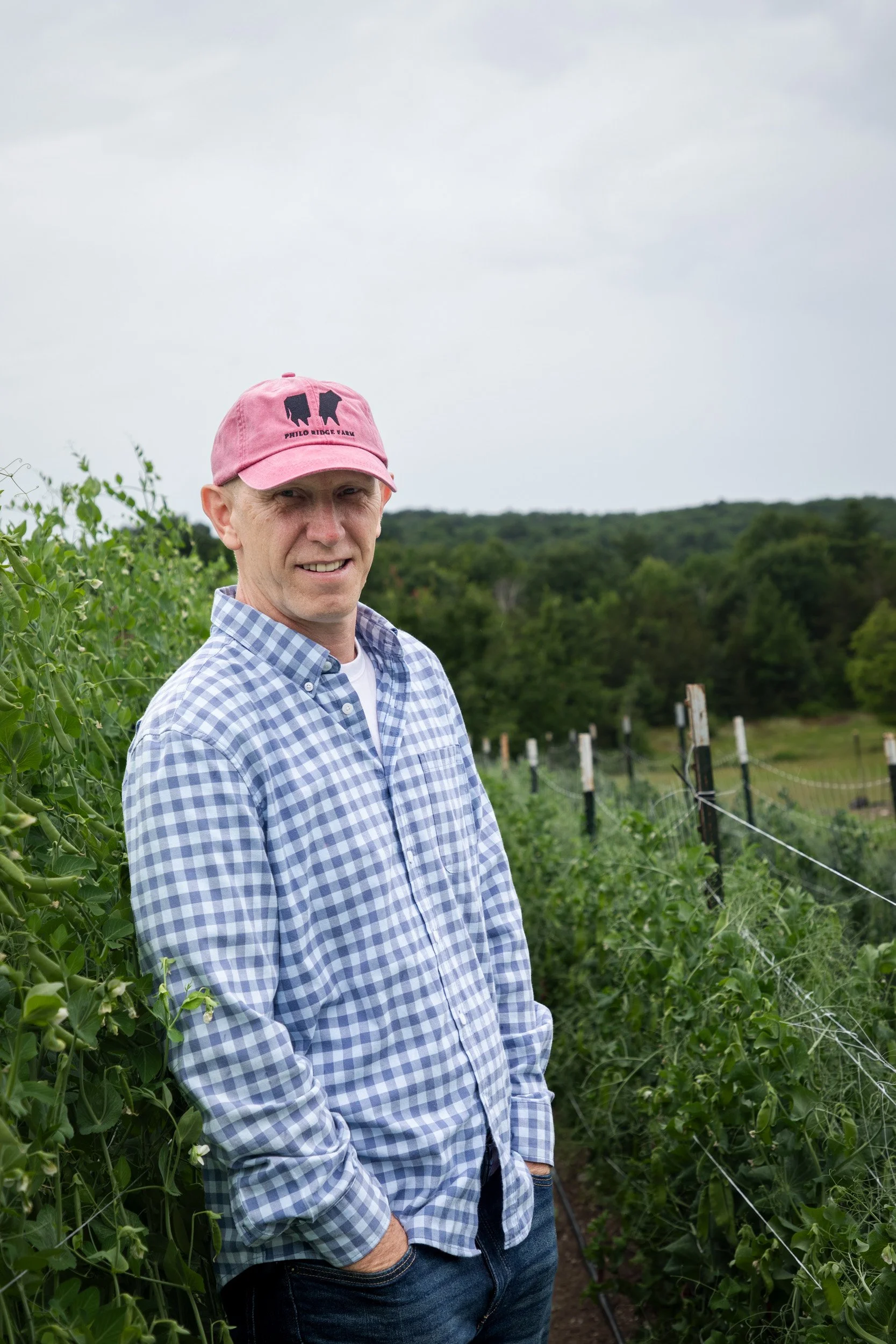Meet Bryan Flower, Our New Executive Director
Bryan Flower is our new Executive Director of Philo Ridge Farm, where he leads the organization’s work at the intersection of organic regenerative agriculture, culinary experiences, and community engagement. With over 20 years of experience in hospitality and food systems (spanning professional kitchens, educational institutions, and sustainable farming initiatives) Bryan brings a thoughtful blend of operational expertise, agricultural knowledge, and mission-driven leadership to his role.
Bryan has worked across the globe, including time spent in South Africa, Europe, the Middle East, and the U.S. In all of these places he has focused on building resilient food systems and leading innovative programs. His career began in the culinary world, where he worked as a chef and food and beverage director in fine dining restaurants and international hotels, including the W Hotel in Chicago, the Hilton Beach Resort in Dubai, and properties in Florida and Mississippi. These roles deepened his appreciation for hospitality and shaped his commitment to creating food experiences rooted in place and purpose.
Bryan speaking at a TEDx event.
His path evolved into food systems education and sustainability leadership, where he spent over a decade in higher education. Most recently, he served as Assistant Director of Food Systems Innovation at Northern Illinois University, where he launched and directed the NIU Edible Campus initiative which is an integrated program focused on food security, environmental stewardship, and student engagement. He also held leadership and teaching roles at Robert Morris University, designing and managing culinary and hospitality programs that combined academic rigor with real-world application. Throughout this time, Bryan remained grounded in hands-on agricultural work, raising livestock and managing pasture-based systems with a deep respect for animal welfare and environmental stewardship.
Watch Bryan’s TEDx presentation, Healthy Soil, Healthy Purpose, here.
Now at Philo Ridge Farm, Bryan draws on these diverse experiences to steward over 500 acres of working farmland while guiding the farm’s transition as a nonprofit hub for organic regenerative agriculture and community learning. He collaborates closely with farmers, chefs, educators, and community partners to ensure the farm thrives as a place of learning, nourishment, and connection. Bryan is especially passionate about bridging the gap between agriculture and hospitality by bringing the stories of the land into the kitchen and fostering meaningful connections between our farmers and visitors.
Originally from England and South Africa and now based in Vermont, Philo Ridge Farm is excited that Bryan is leading our organization as it reflects his lifelong dedication to sustainable food systems, educational access, and the joy of shared meals. Keep reading below to hear directly from Bryan about his path to our farm.
What drew you to the role at Philo Ridge Farm?
It was really the job description that first caught my eye. I was preparing for a presentation and wanted to showcase the range of opportunities within food systems work when I came across the listing for the Executive Director position at Philo Ridge Farm. I read it, looked up the farm, and couldn’t believe someone had created a role that brought together all of my skills and everything I’d been working toward over the past 35 years.
What about Peter's and Diana's vision intrigues/inspires/invites your curiosity?
What intrigues me most about their vision is the potential— the potential for what we can accomplish now that we’ve transitioned to a nonprofit. The opportunities for research, education, and serving as a national model for the future of food systems feel limitless.
What inspires me is everything they’ve already brought to life. The farm and its facilities are incredible, and the team is deeply committed to realizing the vision and outcomes we’re all working toward.
What invites my curiosity is the people, the stewards, farmers, cooks, educators, and community members whose combined knowledge and passion create something truly greater than the sum of its parts. Philo Ridge Farm isn’t just a place, it’s a philosophy in motion, and I want to understand how it works from the inside out.
How would you describe your approach to leadership?
I have often been called a servant leader, someone who leads with purpose, humility, and a deep commitment to others. My approach is rooted in the belief that leadership is not about authority, but about service. I prioritize the growth, well-being, and success of those around me, empowering individuals and teams to thrive by listening first, supporting consistently, and modeling integrity in every decision.
Whether managing a regenerative farm, mentoring emerging leaders, or working alongside staff and community members, I lead by example—rolling up my sleeves, being fully present, and fostering a culture of trust, inclusion, and shared responsibility. I see leadership as a platform to uplift, to inspire vision grounded in values, and to create environments where people feel seen, heard, and motivated to do their best work for a cause greater than themselves.
Why is organic regenerative agriculture important or critical to our future (at the farm, in Vermont, in the greater world)?
Organic regenerative agriculture is critically important—at Philo Ridge Farm, in Vermont, and globally—because it addresses the most pressing challenges of our time: climate change, ecosystem degradation, food insecurity, and the loss of connection between people, land, and food. We can no longer separate food from ecology, health, or justice. Regenerative agriculture is a powerful, hopeful response, grounded in science, tradition, and community, to regenerate not just land, but culture. It offers a model for how we can feed ourselves while restoring ecosystems and building a better future for all.
What are your initial impressions of Vermont's agricultural community?
I feel deeply inspired and energized by the Vermont agricultural community. Its strong sense of place, shared values, and commitment to regenerative practices resonate with my own philosophy and goals. I’m drawn to the collaborative spirit among farmers, the openness to innovation, and the pride Vermonters take in stewarding the land with intention.
I admire how the community blends traditional wisdom with forward thinking approaches, whether through organic production, small-scale livestock, or diversified vegetable farms—and how agriculture here is about more than just food; it’s about community resilience, environmental responsibility, and cultural identity.
What's your earliest memory connected to farming or food production?
My earliest memory connected to food production was with my grandfather, Bernard Flower. He used to keep an allotment (a plot of land rented out, usually by a local council, for individuals to cultivate for growing vegetables, fruits, and flowers) in England where I was born. He also used to have a greenhouse in his back yard and a small space where he would keep chickens and rabbits for meat and eggs. I always remember my grandmother telling us we were having chicken for Sunday dinner, but when we counted the rabbits there was always one less. He used to have amazing rhubarb and peas and carrots growing at his allotment and the biggest onions I had ever seen. My cousin and I used to ride our bicycles to his allotment and eat the peas off the vine and pull carrots out of the garden to eat. His friends would tell him that it was us, and we would usually get into trouble, but it was way too tempting to stop.
Outside of work, what activities or hobbies help you stay connected to the land?
I enjoy going camping with my family and love to get out and walk and bike around the area. I have skied for many years and look forward to getting back into that rhythm as the seasons change.
Is there a particular food or agricultural tradition from your background that you cherish?
More than any specific food, what I truly cherish are the opportunities to gather with friends and family and share a meal. It’s around the table, whether it’s a weeknight dinner, a holiday feast, or an impromptu BBQ, where some of life’s most meaningful moments unfold. Food, for me, is a conduit for connection. It invites laughter, storytelling, reflection, and sometimes even healing.
The act of preparing and sharing a meal is one of the most honest expressions of care and community I know. It reminds me that nourishment isn’t just about what’s on the plate, but who’s around it. These shared experiences ground me in gratitude and keep me rooted in what truly matters—relationship, presence, and belonging.
What's a book or resource about agriculture that has shaped your thinking?
Gabe Brown’s “Dirt to Soil” was a turning point in how I began to understand the interconnectedness of our farming practices and the natural world. His journey from struggling conventional farmer to regenerative agriculture pioneer opened my eyes to the power of working with nature rather than against it. What struck me most was how he reframed soil not as an inert growing medium, but as a living, breathing ecosystem teeming with microbial life—a foundation that supports the entire food web.
Reading that book helped me realize that many of the problems we face in agriculture—poor soil fertility, water scarcity, pest outbreaks—are symptoms of deeper imbalances caused by extractive, input-heavy systems. His five principles of soil health (limited disturbance, armor on the soil, living roots year-round, plant diversity, and animal integration) offered a clear, replicable roadmap for restoring ecological balance. These aren’t just philosophical ideas; they are actionable and rooted in observable results and this is exactly what Philo Ridge Farm is doing.
How do you define "sustainable agriculture"?
To me sustainable agriculture is the practice of farming in ways that meet our needs without compromising the ability of future generations to meet their own needs. It balances environmental health, economic profitability, and social equity. More specifically, sustainable agriculture protects and regenerates natural resources, supports viable farm economies and strengthens communities – by creating local food systems, fostering transparency in the supply chain ensuring access to nutritious food. It also reduces environmental harm and promotes animal welfare through humane, low-stress, and pasture-based systems. In essence, it’s farming that works with nature, not against it, while honoring the people and systems that depend on it.
Please join us in welcoming Bryan and his family to the Charlotte community! As he and his family settle into life in Vermont, we hope you’ll extend a warm welcome and help them feel right at home. Whether it’s a quick hello, a favorite local recommendation, or an invitation to connect, feel free to drop him a line at bflower@philoridgefarm.org.





